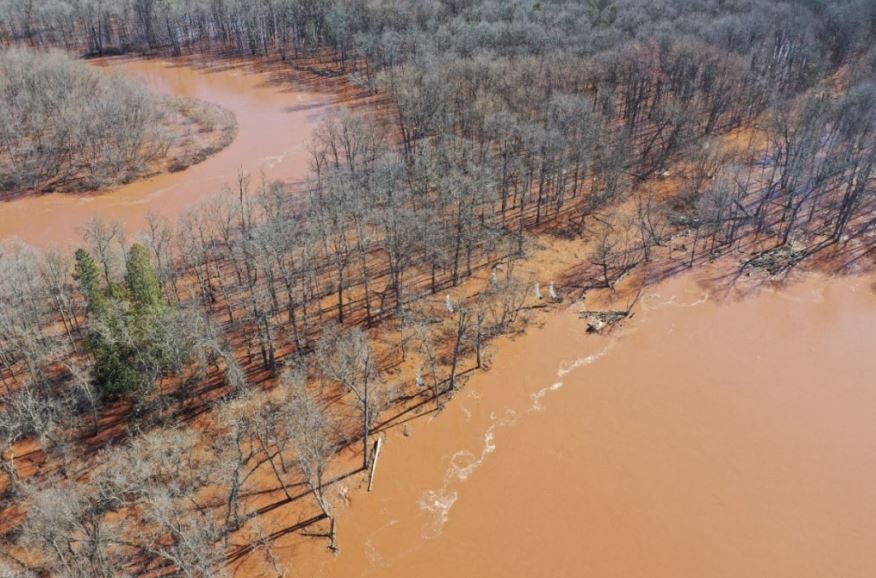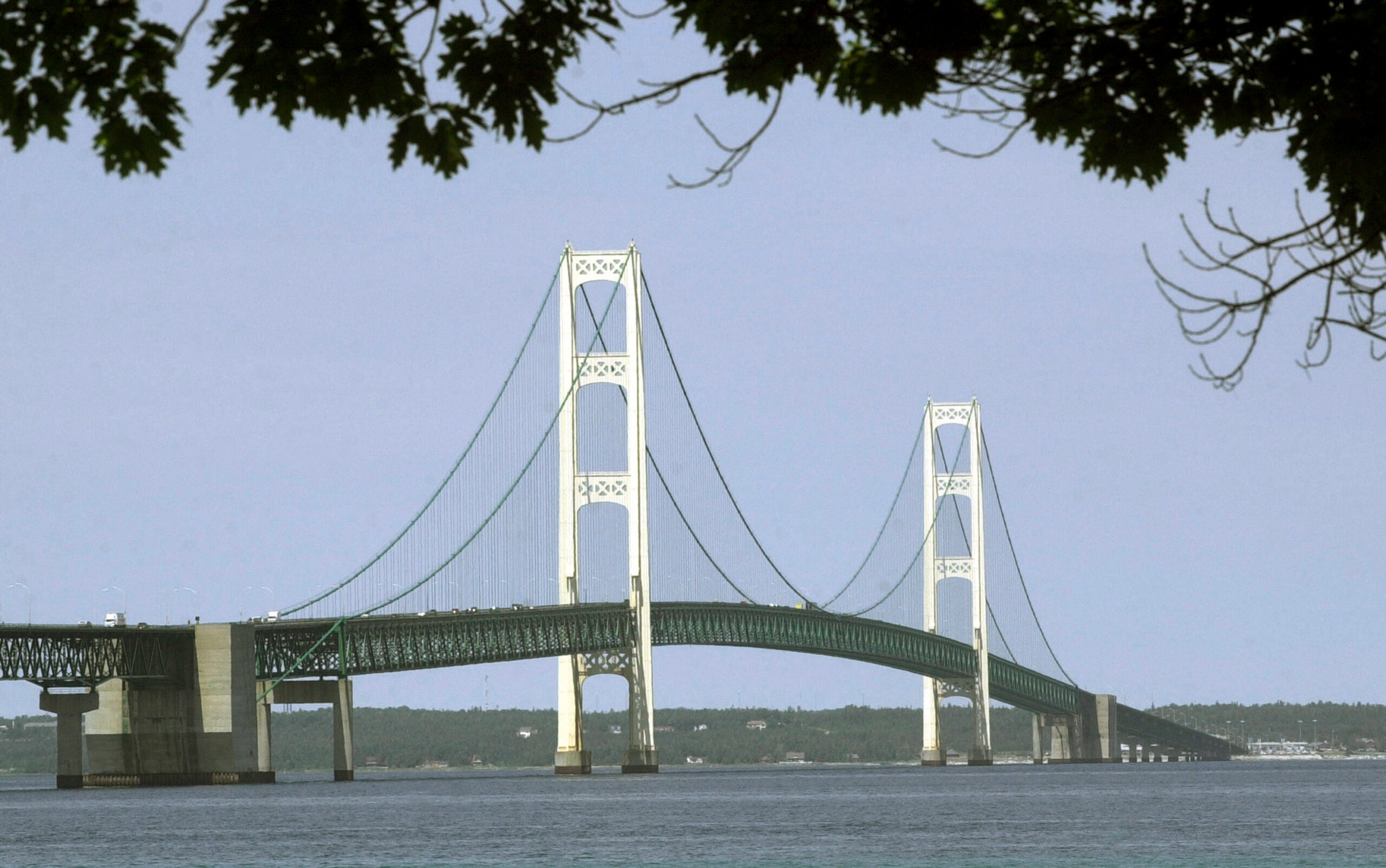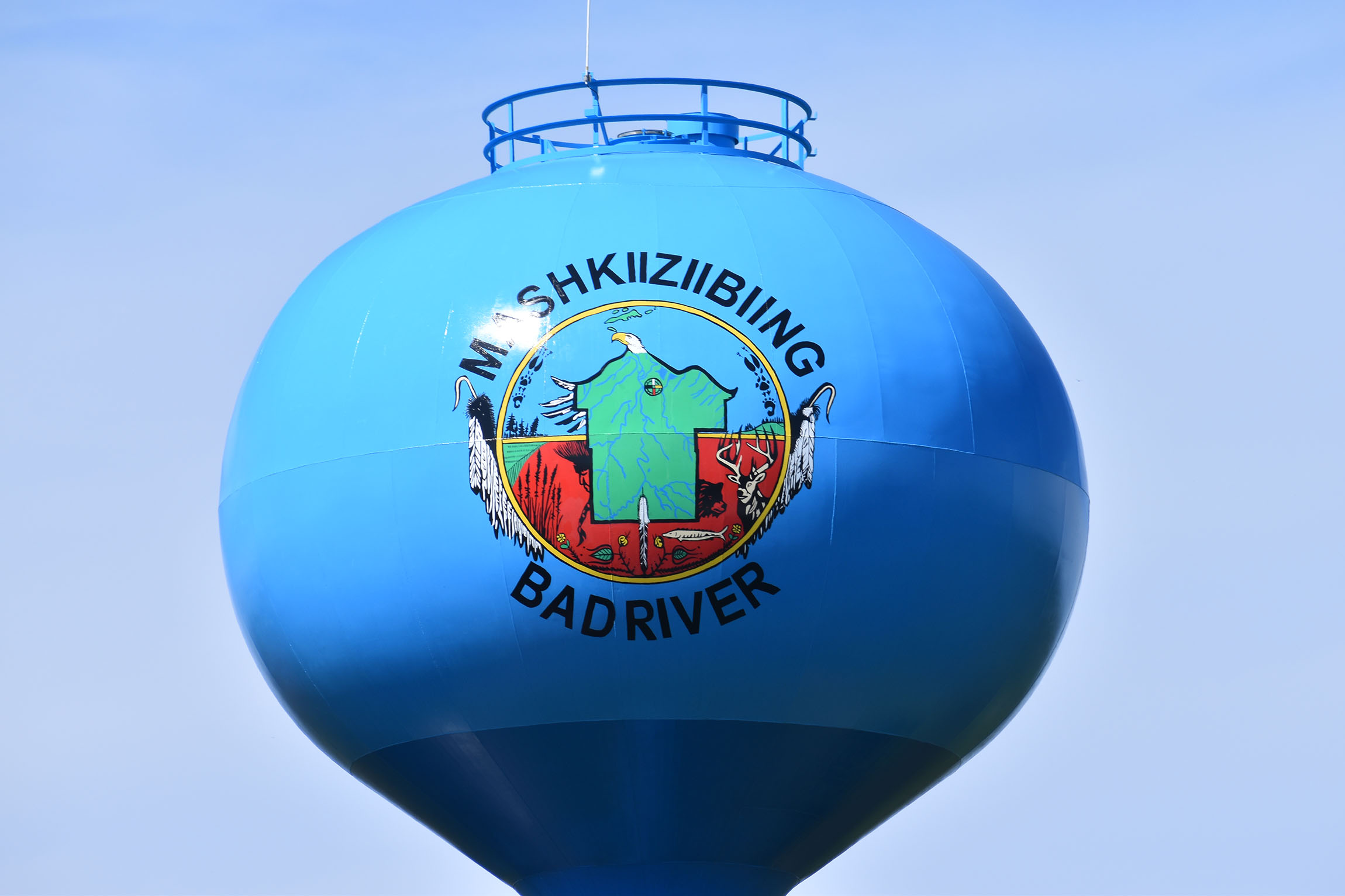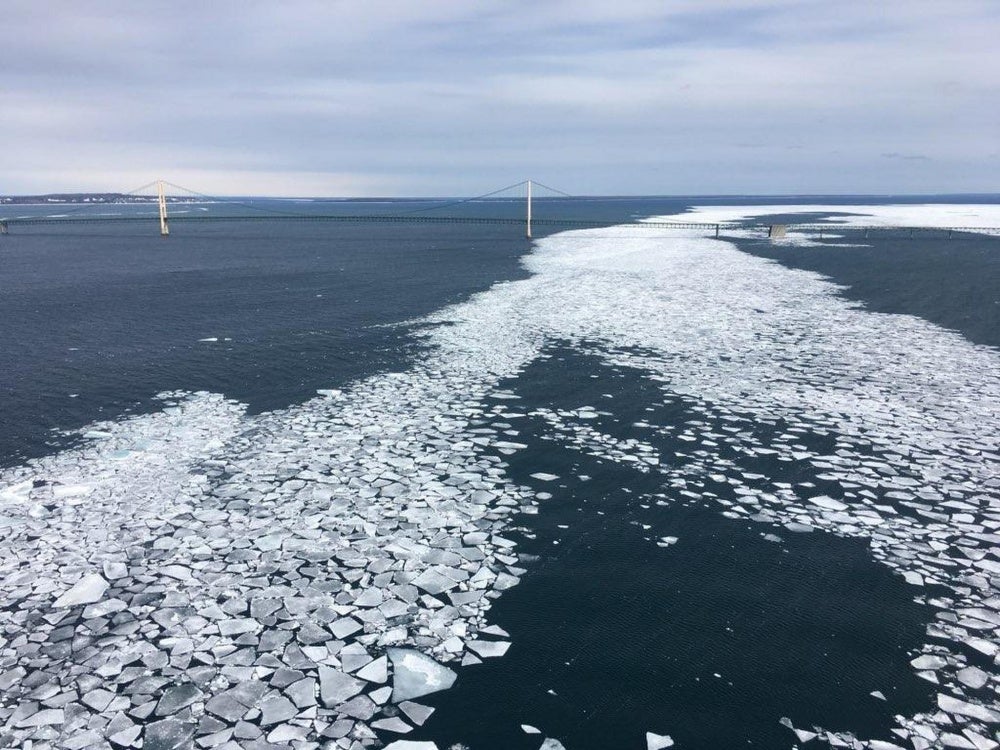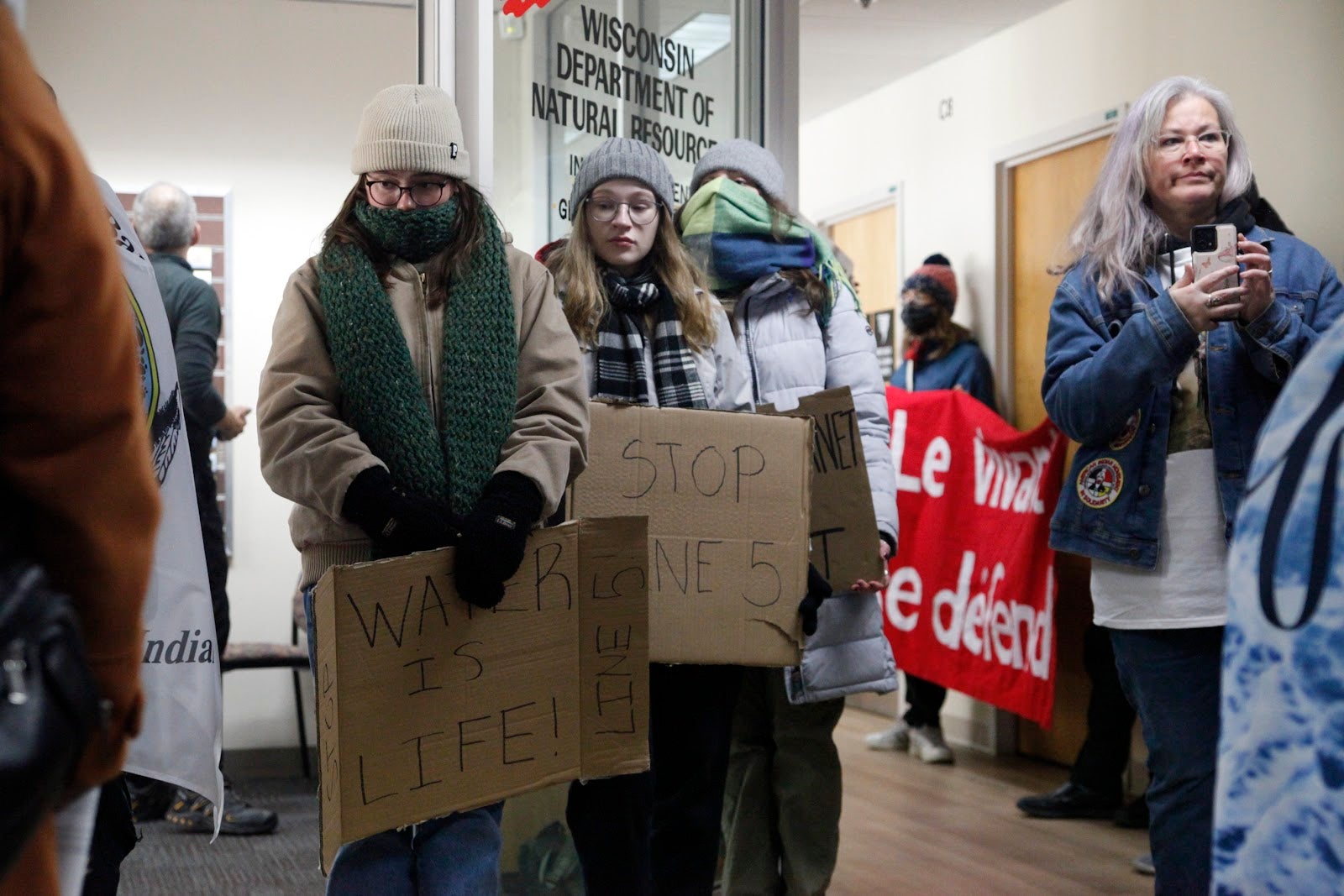Spring flooding has worsened river bank erosion near a Canadian firm’s oil and gas pipeline on a northern Wisconsin tribe’s reservation, heightening fears among some that the pipe could become exposed.
The Bad River Band of Lake Superior Chippewa and subsidiaries of Enbridge, Inc. filed a joint brief in federal court Monday that states the banks of the Bad River have lost up to about 10 feet in some spots over the past two weeks. In early April, warm weather caused rapid snowmelt and runoff into the Bad River watershed.
According to court documents, the river ran over its banks on April 11 at an area known as “the meander” where erosion threatens to expose Enbridge’s Line 5 oil and gas pipeline. At one location, the river had come within 25 feet of the pipe in February. That same area had lost 7.5 feet of the river bank as of Friday.
Stay informed on the latest news
Sign up for WPR’s email newsletter.
“The shortest distance between the pipeline and the River is now roughly 17–18 feet,” attorneys wrote in the filing.
The update was submitted as part of the tribe’s years-long federal lawsuit against Enbridge. In 2019, Bad River sued the company to shut down and remove Line 5 from its reservation. The tribe argues the 70-year-old pipeline poses an unreasonable risk to health and safety. Bad River Tribal Chair Mike Wiggins, Jr. didn’t immediately respond to a request for comment.
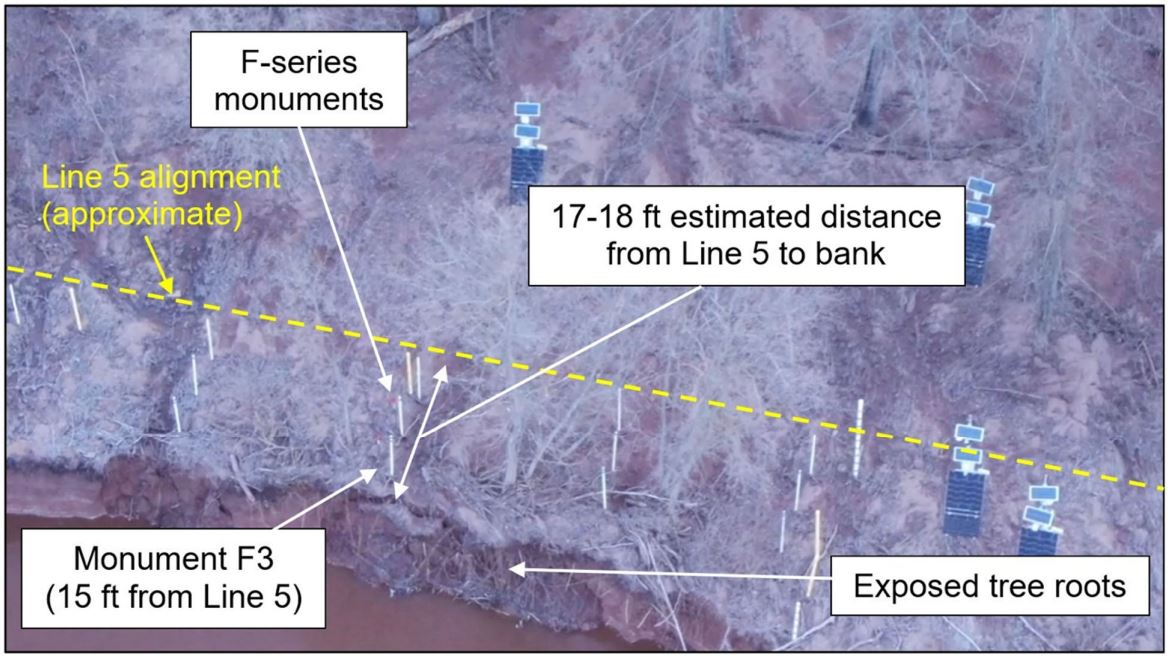
Screenshot of images from court filings
In response to the tribe’s lawsuit, Enbridge is planning to build a $450 million pipeline that would run 41 miles around the Bad River reservation. An Enbridge spokesperson said in a statement Monday that the pipeline continues to operate safely, serving as an energy lifeline for millions in the Great Lakes region. Line 5 carries up to 23 million gallons of crude oil and natural gas liquids each day from Superior across northern Wisconsin and Michigan to Sarnia, Ontario.
“We are diligently monitoring our pipeline, water levels on the Bad River, and local weather conditions in real time around the clock,” Enbridge spokesperson Juli Kellner said. Kellner said protection of the environment and the public is the company’s highest priority, adding its pipeline inspection and monitoring programs provide multiple layers of safety.
In November, a federal judge ordered the tribe and Enbridge to provide a joint proposal for shutting down and purging oil and gas from the pipeline to avoid a “catastrophic” rupture should conditions worsen. The tribe and Enbridge submitted competing plans, and the parties said in their brief that neither plan requires the pipeline to be shut down or purged under current conditions.
Flows on the Bad River rose and fell twice through April 23 with the river running out of its banks for nine days, according to the filing. Some of nearly three dozen markers installed to gauge the distance between the river and the pipeline fell due to erosion or were knocked over by floating debris. The two parties say they communicate daily on conditions.
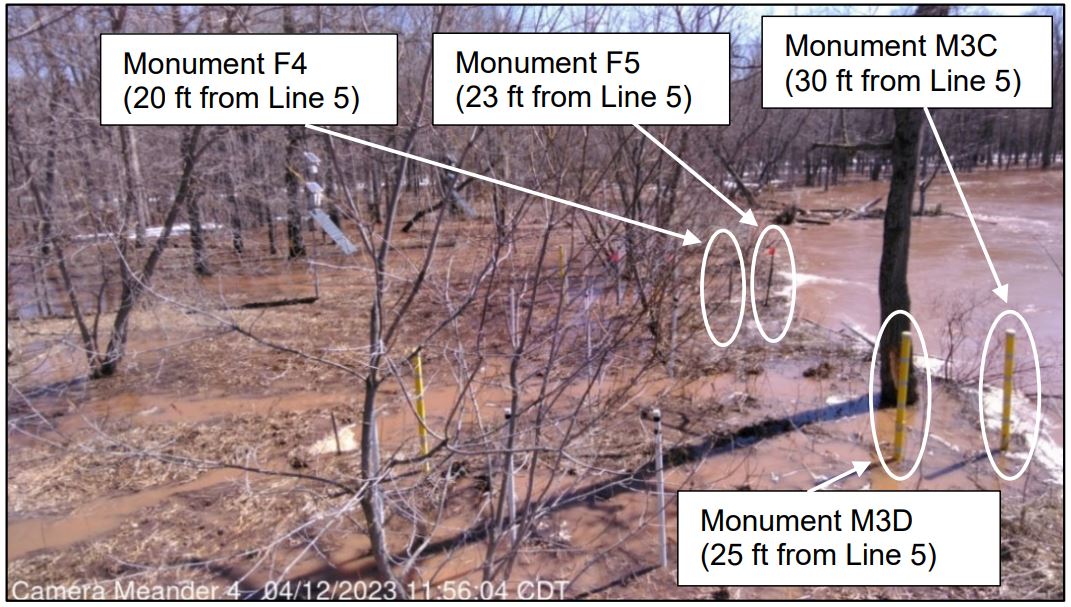
Screenshot of images from court filings
Some environmental and Indigenous groups want the pipeline shut down, including Sierra Club Wisconsin. The group’s director, Elizabeth Ward, said the worsening erosion is scary and highlighted threats to the pipeline from severe storms. She noted a flood in 2016 caused the Bad River to run over U.S. Highway 2, causing tens of millions of dollars in damage across the region.
“We have seen the amount of damage that can be done by one flood, so we could be one flood away from a potential breach, which of course would be devastating for the water in the area and potentially make its way to Lake Superior,” Ward said.
In his November order, U.S. District Judge William Conley said even a flood beyond what northern Wisconsin witnessed in 2016 would be unlikely to raise immediate concerns about the pipe’s integrity, saying the risk of a rupture was at least a year away.
Industry groups like Wisconsin Manufacturers & Commerce dismissed concerns. Scott Manley, the group’s executive vice president of government relations, said the pipeline has operated safely despite the region’s past experience with severe storms.
“The fact that we’ve got some elevated water levels at the moment, I would not expect that to actually result in any kind of concern relative to the safety of the pipeline,” Manley said.
Manley contended the bigger problem would be a shutdown, saying a disruption in the flow of oil would lead to massive price spikes for fuel. Enbridge experts have said in court filings that shutting down Line 5 could result in the loss of thousands of jobs and billions in economic output in the Upper Midwest, as well as increase fuel costs by an estimated $20 million each year in Wisconsin. The tribe’s experts claim Enbridge is vastly overestimating losses from a shutdown.
Bad River argued in its initial complaint that the average loss of river bank each year was about 13 feet from 2015 to 2019, but the bank has remained stable in recent years due to below average flooding.
According to court filings, one engineering analysis stated Enbridge’s 2021 protocols would allow more than 90 feet of the pipeline to become exposed before initiating a shutdown. The company’s 2019 plan called for a shutdown when markers as close as 15 feet from the pipe are lost.
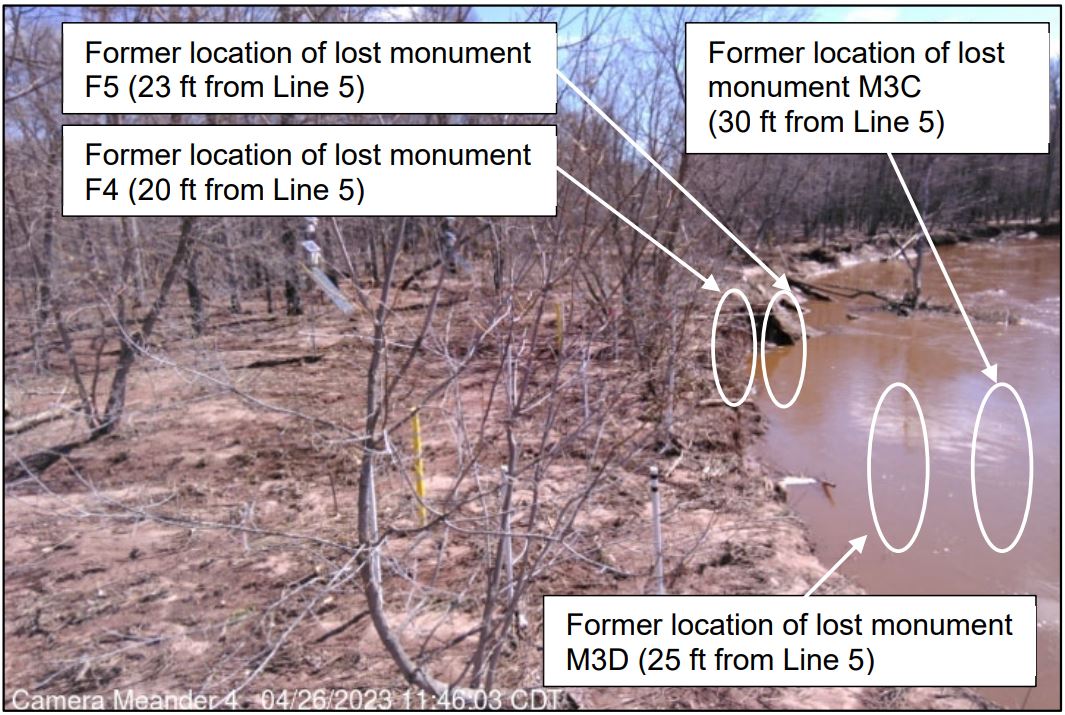
Screenshot of images from court filings
Paul Demain, board chair for the Indigenous-led group Honor the Earth, noted Gov. Tony Evers has declared an emergency statewide over the potential for widespread flooding. He said recent rain and snowmelt seems to pose a more imminent threat of exposure and a potential spill.
“It’s not just Bad River who suffers catastrophic damage to an economic crop like wild rice or their fisheries,” Demain said. “It’s everybody in the region that is dependent on water, and that really is the battle to make sure that there isn’t an accidental spill.”
In August, the DNR investigated a possible spill near the Bad River reservation after an Enbridge contractor reported contaminated soil south of Ashland. Enbridge has said only a tablespoon of product was found.
Demain highlighted a 2010 oil spill from one of Enbridge’s pipelines near Marshall, Michigan. The ruptured pipe released 843,000 gallons of oil into a nearby creek that flowed into the Kalamazoo River. The company didn’t identify the leak for 17 hours.
Since then, Enbridge has said it’s invested billions to bolster the safety of its pipelines.
“Enbridge is prepared with necessary plans, procedures, response personnel and equipment should they be required,” Kellner said. “Pipeline and Hazardous Materials Safety Administration, the exclusive federal pipeline regulator, has repeatedly audited Line 5 and has raised no safety concerns at this location.”
Line 5 has had around 30 spills that have released more than 1 million gallons of oil and natural gas liquids on land since 1968, according to federal pipeline safety data obtained by the National Wildlife Federation.
Enbridge and the Bad River tribe are planning a joint site visit within the next two weeks to further examine conditions. Conley has yet to issue a final ruling on the tribe’s lawsuit against Enbridge and the fate of Line 5 on the tribe’s reservation.
Background on Bad River’s case against Enbridge
Conley has previously found Enbridge trespassed on the tribe’s lands after easements on about a dozen parcels expired in 2013. The Bad River tribal council refused to renew them, but Enbridge countered it had secured easements on the vast majority of tribal lands through 2043.
Conley has said he’s inclined to require Enbridge to reroute the pipeline outside the tribe’s reservation within five years rather than shutting down the line, citing significant effects on regional economies and the U.S. trade relationship with Canada.
The DNR has yet to issue a final environmental impact statement for the Line 5 reroute. Wisconsin Public Radio reported last year that the Environmental Protection Agency found the state had yet to fully analyze its potential effects on water resources, climate change, treaty rights and spill risks. Enbridge has said its spill modeling shows a 1 in 15 million chance of a significant rupture in any given year.
Wisconsin Republican lawmakers, labor unions and the state’s largest business lobby support Enbridge’s plans to reroute Line 5. They have touted the 700 jobs that would be created along with the $135 million economic impact it would have on the state.
Wisconsin Public Radio, © Copyright 2025, Board of Regents of the University of Wisconsin System and Wisconsin Educational Communications Board.
